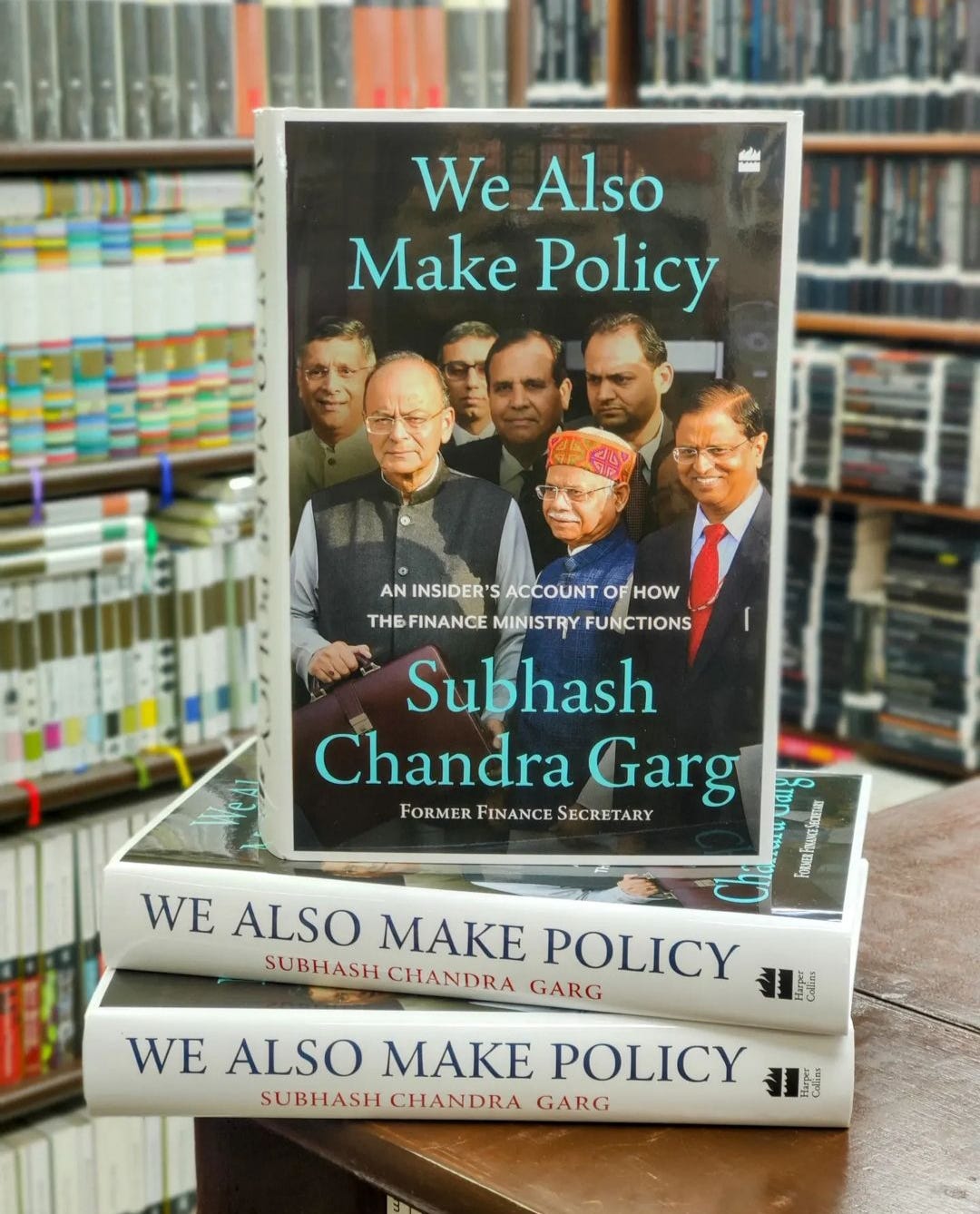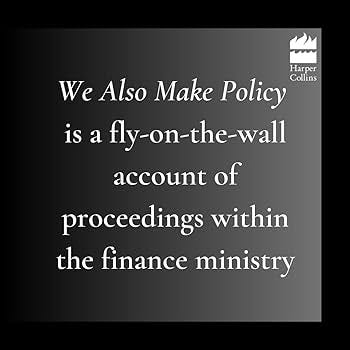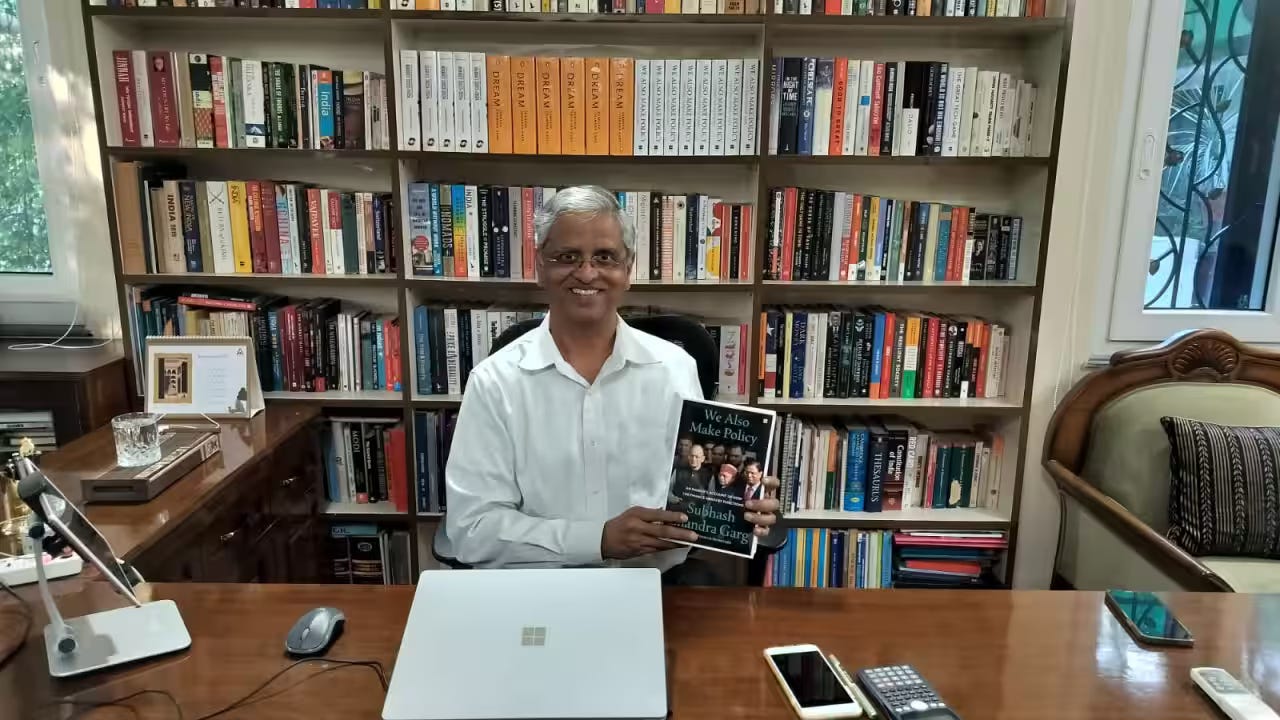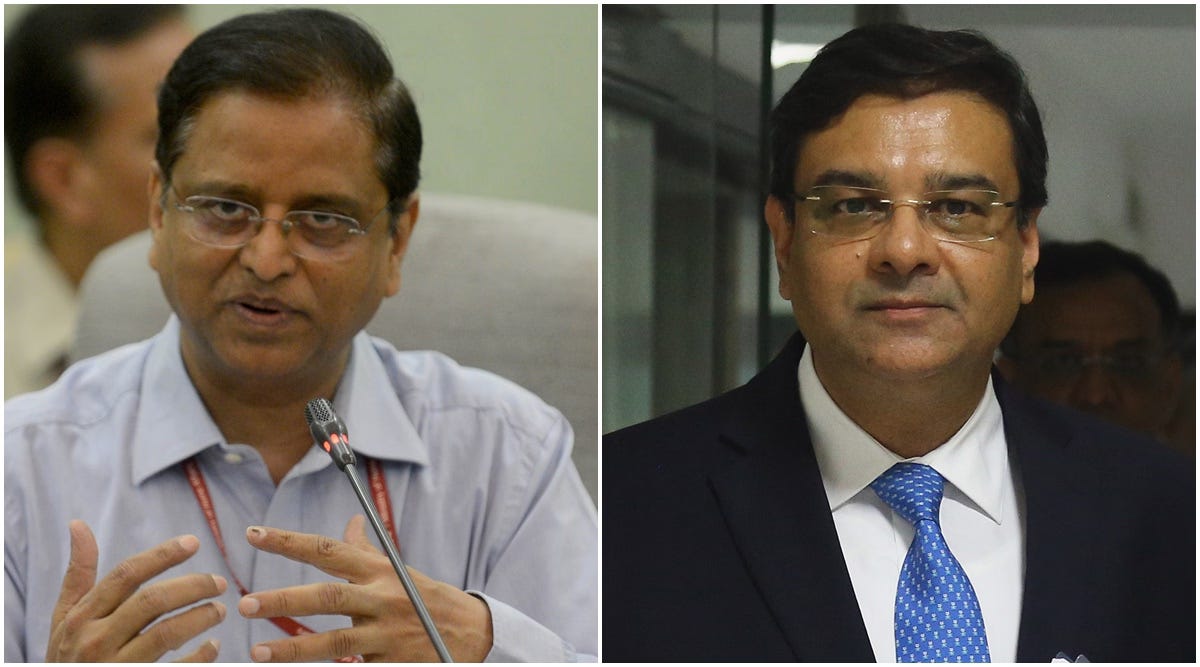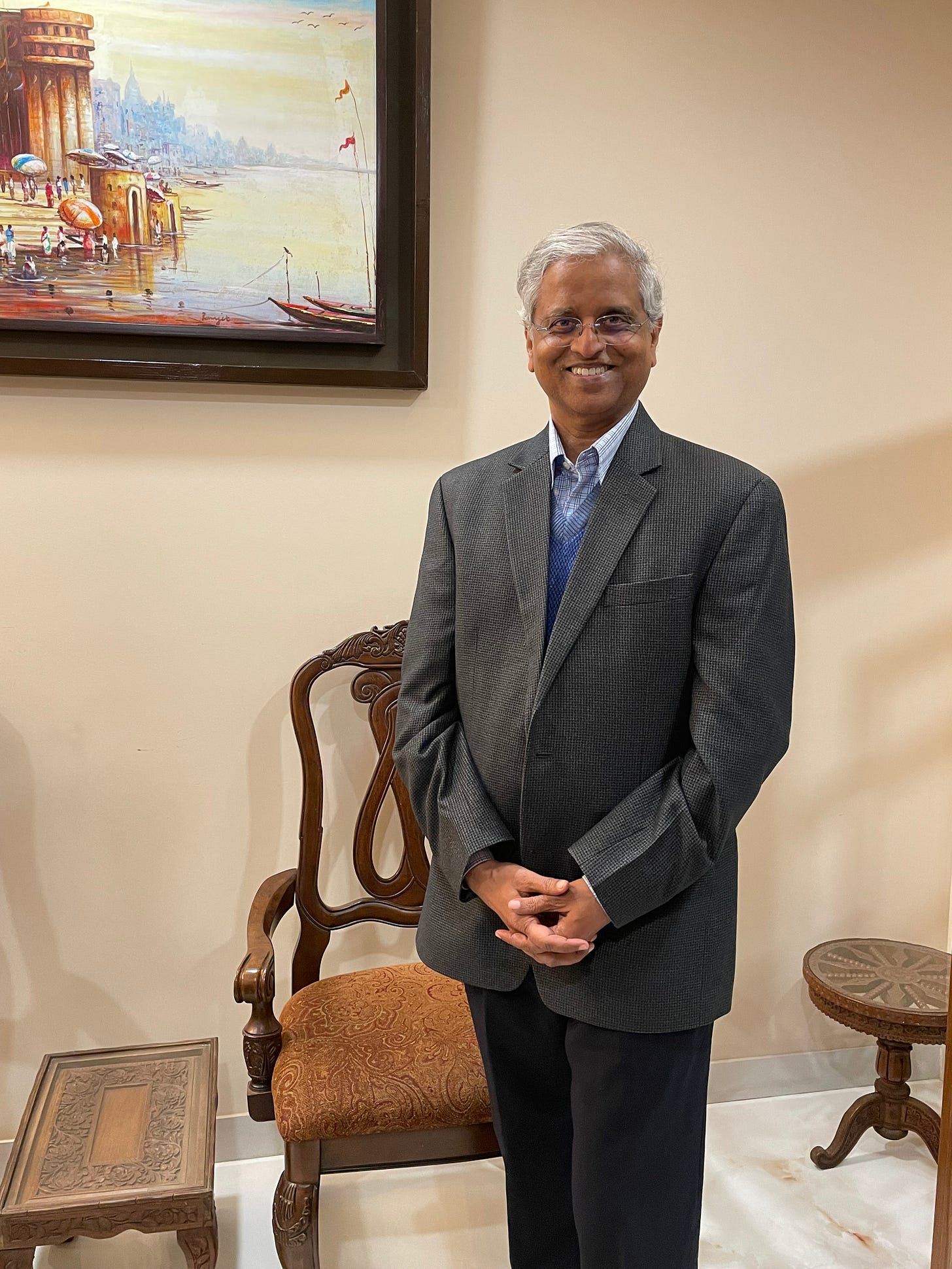Memoirs of Economic Governance: Inside India's Finance Ministry - An Interview with Subhash Chandra Garg
Subhash Chandra Garg's candid narrative, "We Also Make Policy," takes readers behind the curtains of India's Finance Ministry during his tenure from 2017 to 2019. As an independent economic writer, delving into this insider's exposé sheds light on the intricate workings of economic decision-making within the Indian government.
The book does not solely focus on policies but presents a unique perspective on the day-to-day operations, shedding light on the significant role personalities and relationships play in shaping these policies. Garg meticulously chronicles interactions with key figures like Prime Minister Narendra Modi, former finance minister Arun Jaitley, and current finance minister Nirmala Sitharaman, providing an unprecedented glimpse into their attitudes, gestures, and interactions.
One of the book's remarkable aspects is its raw portrayal of bureaucratic functioning. Garg reveals the nuanced dynamics within the ministry, depicting his varying relationships with different finance ministers. His amicable association with Jaitley contrasts sharply with the strained ties with Sitharaman, offering valuable insights into their differing approaches and resulting clashes.
Garg does not shy away from detailing confrontations and disagreements, particularly with Sitharaman, highlighting how these conflicts influenced his decision to retire voluntarily. His unfiltered narration provides a rare insight into the internal strife and challenges faced within the government corridors.
Additionally, the book offers an intriguing perspective on Prime Minister Modi's changing rapport with Garg, starting with trust and shared priorities but evolving into an apparent distancing from early 2019. This evolving relationship presents a unique angle on the personal dynamics influencing policy decisions.
Moreover, the book goes beyond personal anecdotes to dissect key policy matters. Garg's account provides a granular view of significant economic events, such as clashes with the Reserve Bank of India (RBI) and pivotal decisions during his tenure, offering readers a closer look at the making of critical economic policies.
While the book might appear critical, it stands out for its balanced and objective portrayal of events, avoiding unnecessary sensationalism. Garg's narrative style, devoid of animosity or self-aggrandizement, elevates the book's credibility, making it a must-read for anyone keen on understanding the nuanced interactions and decision-making processes within the Finance Ministry.
"We Also Make Policy" is not just a memoir but a valuable resource shedding light on the intricacies of governance, economic policy formulation, and the interplay of personalities in shaping India's economic landscape. Garg's frank and insightful account offers readers a front-row seat to the inner workings of the ministry, making it an essential read for those interested in the dynamics of policymaking and governance.
Excerpts from the Interview :-
Q1) Can you share a specific example from your time as Finance Secretary that illustrates the challenges and complexities involved in crafting and implementing economic policies in India?
The policies, economic or others, are crafted by the political and administrative executive working together. The political executive has two primary objectives to serve- first it has to get re-elected and second, it needs to serve the public interest. The administrative executive has life-time security of job, though not of particular postings. The administrative executive can therefore focus on public interest exclusively. The interplay of these interests while crafting economic policies impart the real life challenges and complexities, especially for the policies which serve the public interest but may not be in the short-term political interest.
There are numerous instances in the book- the electoral bonds, privatization of airports, issue of sovereign bonds, recapitalization of public sector banks, crypto-currencies and so on, which illustrate the challenges, complexities and the fun of crafting economic policies.
There is not so much complexity in implementing in economic policies once the policy decisions are made though the consequences of bad policies e.g. bank nationalization, administered petroleum prices, food subsidies etc. can be disastrous and can cause enormous loss to the country.
Q2) Your book highlights your strained relationships with key figures like Nirmala Sitharaman. Can you elaborate on the factors behind these conflicts and how they influenced economic policy decisions?
I suggest readers can go through the Chapter ‘Don’t Think I Can’t Violate You’ to understand and appreciate the evolution of ‘strained’ relationship between Mrs. Nirmala Sitharaman and me. I do believe that it affected policy making and budget 2019-20 though I would not characterize the relationship as ‘conflict’. In fact, in my understanding, both the Finance Minister and Finance/Economic Affairs Secretary have their responsibilities and a job to perform. There is bound to be differences in their understanding and approach to the policy making as their incentives/objectives might not coincide sometimes.
For how the relationship impacted economic policy making and the budget 2019-20. She thought I was trying to control the finance ministry and believed that I did not think she knew enough about finance. But that is her opinion, not mine. To me, she was the finance minister. In the history of India, there were many finance ministers who did not know much initially, but they were smart and quick learners.
Sitharaman seemed to have a bias against me. During a meeting about planning the budget, I explained that it is customary to listen to suggestions without revealing the government's thoughts. However, Sitharaman reacted strongly. She first said she would listen to me, but then she angrily said she could go against my advice. It was unexpected and made me feel uncomfortable and embarrassed. I did not show any reaction in the meeting, but later, I spoke with her privately.
In our conversation, she accused me of treating her like a child. It was clear to me that she had some negative feelings towards me, which made our working relationship difficult.
Q3) Your book challenges government claims regarding policies like MSP increases and foreign direct investment success. What specific discrepancies or challenges did you encounter, and how did they impact policymaking?
The notable point about MSP policy is that while the government could claim, in principle, providing 50% profit over cost for all the crops under MSP regime, in practice, this did not happen as the requisite mechanism of buying all the quantities selling at prices lower than MSP was not put in place for most of the newly covered crops. The policy was optically adopted and practically not implemented.
As regards FDI in single brand retail Apple, the adopted policy was flawed yet it succeeded in practice as other complementing policies/factors like PLI on large electronics and the global imperative of moving away from China imparted the much-needed positive push.
Q4) The book mentions your changing relationship with Prime Minister Modi. How did these changes affect your ability to drive economic policies during your tenure?
Of course, if the Prime Minister turns a little lukewarm, a Secretary’s ability to push reforms certainly gets weakened. The Prime Minister is the Chief Executive & Arbiter of the Government and the final decision maker.
I suspect weakening of fiscal deficit discipline, getting through of certain weaker policies like hurried overcapitalization of banks, handing over the resolution of non-banks to RBI etc. were the result of this changing relationship. The biggest difference was made by transferring me out of Economic Affairs which cut me completely from the economic policy making. This decision though prompted by the Finance Minister was taken by the Prime Minister.
Q5) Can you discuss a particularly challenging or controversial policy issue or decision-making process from your time as Finance Secretary that reflects the intricacies of economic policymaking in India?
I think the economic capital framework of RBI which decide division of RBI surplus between transfer to government and retention thereof by the RBI perhaps was the particularly most challenging policy matter which also generated considerable controversy.
During my tenure as Finance Secretary, one of the most intricate and contentious policy matters revolved around the disagreement between the Finance Ministry and the Reserve Bank of India (RBI) regarding the Economic Capital Framework (ECF). This framework determined the appropriate level of reserves the RBI should maintain and how much surplus could be transferred to the central government annually.
The divergence of views began when I attended a meeting as a member of the RBI's Central Board of Directors in August 2017. At this meeting, the RBI proposed retaining a significant portion of its surplus, prompting my interest in examining the central bank's ECF, which I believed was overly stringent.
Tensions escalated during discussions, with RBI Governor Urjit Patel expressing adamant resistance to revising the ECF, stating it would only happen "over his dead body." This friction intensified throughout 2018, leading Prime Minister Modi to convene a meeting in September where he voiced concerns about the RBI's surplus reserves, likening it to a snake guarding a treasure.
The situation worsened, culminating in accusations that the government was depleting the RBI's reserves. This disagreement over the ECF reflected the intricate nature of economic policymaking in India, highlighting the complexities and diverging perspectives between the Finance Ministry and the RBI regard During my time as Finance Secretary, there was a big disagreement between the Finance Ministry and the Reserve Bank of India (RBI) about how much money the RBI should keep as savings and how much it should give to the government.
Thank you all for reading and a big thanks to Subhash Sir for collaborating in today’s post!
It’s a pleasure!
ABOUT THE AUTHOR
Subhash Chandra Garg, a seasoned bureaucrat with over three decades of service in the Indian Administrative Service (IAS), has held pivotal roles in both the central and state governments. With a diverse experience ranging from Economic Affairs Secretary to managing directorships and district-level administrative positions, He has been deeply engaged in public administration, policymaking, and budget crafting.
During his tenure, he played a significant part in steering economic policies, handling state finances, and contributing to critical decisions at the national level. His expertise spans across the execution of developmental programs, formulation of budgets, and policy execution.
Having served in key positions like Finance Secretary of India and Economic Affairs Secretary, Garg has been instrumental in shaping economic strategies and policies. His involvement in multiple government sectors has equipped him with a comprehensive understanding of the intricate workings of public administration.
Post his voluntary retirement from the IAS, he has transitioned into a prominent policy observer, strategist, and commentator. He's become an influential voice in discussing vital economic and fiscal affairs, focusing particularly on the Indian economic landscape.
He has authored books like "The $10 Trillion Dream: The State of Indian Economy and The Policy Reforms Agenda," providing insights into India's economic state and policy reform prospects. His subsequent book, "Subhash Chandra Garg's Explanation and Commentary on Budget 2023-23," dives into Budget analysis, emphasizing the national significance of central government budgets.
As a writer, he contributes opinion-editorials and columns to various print and online publications, sharing his expertise on economic and financial policy matters. He actively engages with think tanks, educational institutions, and investors, offering his perspectives on the economy, budget, and public policy through appearances on television discussions.

